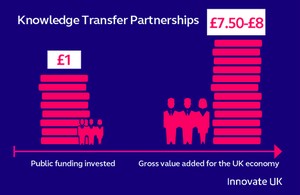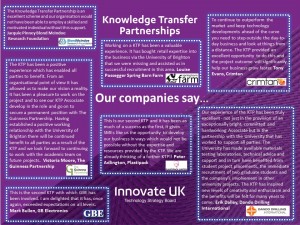Monthly Archives: November 2015
Calling all graduates!

Have you already found the right job for you? Or are you looking for the next step up in your career?
Either way, we would like your feedback!
Knowledge Transfer Partnerships (KTP) have been placing graduates with innovative companies for over 40 years. The University of Brighton has a strong track record in KTP, and we would like to see more University of Brighton graduates applying for our roles – this is a big reason why we are seeking your views.
With a chance to win a £30 Amazon voucher you will help inform our recruitment strategy at the University of Brighton. We would like to hear your experiences of employment after graduation, what you value in a role, and how you have gone about finding a job after graduation. Your views will make a real difference to how we advertise our vacancies, where we advertise and how we describe our roles.
Please complete the survey here.
Make sure you complete the survey before it closes on Tuesday 1 December!
By completing this survey you will be entered into a Prize Draw to win a £30 Amazon voucher. You will also have the opportunity to participate in a focus group to find out more about KTP.
If you would like further information about KTP before completing the survey, please see our website.
If you would like further information on the survey before completing it, please contact ktpjobs@brighton.ac.uk.
Thank you for your time!
Just some of the places we’ve had KTP projects over the years…
Did you know… Every £1 invested by KTP sponsors has returned £7 to £8.50 to the UK economy
An interview with… Dr. Emily Pike-Wilson
- What’s your experience with KTP to date?
This is my first KTP which I have joined as the academic supervisor. Current research at the University of Brighton in cryogenics and energy storage naturally led to an involvement with Highview Power Storage.
- What is your KTP project(s) about and how are you getting involved?
The KTP project is in partnership with Highview Power Storage, based in London. Highview design and develop large-scale liquid air energy storage (LAES) plants. Our involvement in the work focuses on the material selection for the packed beds used for thermal storage and future design tools which can be implemented by the company.
- What would you say is the best thing about the KTP scheme?
I would say that the best thing about a KTP is the relationship that is formed between industry and academia, allowing both parties to learn new technologies and gain valuable experience.
- Why do you think the KTP scheme is important to
- the university
The KTP is a great opportunity for the university to form strong links with industry, working at the forefront of cutting edge research. For example, this KTP has required new experimental methodologies to be developed which can now be applied to academic research. The KTP has required cross disciplinary research between engineering and geology within the university, which adds further dimensions to the applications of this work.
- companies
The main advantage to the company is access to the knowledge and resources at the university. The aim of the KTP is to answer a question that a company has but doesn’t have the knowledge within the company to answer. For this KTP, the solution required developing experimental methodologies, an area which the university has both the resources and experience in.
- graduates
The KTP offers a unique chance for a graduate to work within a company, taking leadership of a project. The graduate can integrate themselves into the company, taking on responsibility from the start which is a rare and valuable opportunity in industry. The training budget allows for the graduate to improve and learn anything that they feel is necessary to aid them in their work which, hopefully, builds their confidence. They can also attend courses at the university which include many business and personal development courses.
- What would you say about the KTP scheme to colleagues who might be thinking about getting involved?
I would recommend the KTP as an excellent way to further academic research and to form links with industry, with both parties benefitting from developing new technologies and techniques. It is exciting to see the application of the work conducted at the university being implemented into developing industrial technologies.
- If you could use 3 words to describe KTP, what would they be?
Collaboration, development, knowledge.
What our companies say about KTP
The ins and outs of KTP for academics
Developing fuel cell technology at Ceres Power with KTP
Ceres is a world leading developer of next generation fuel cell technology. Based in Horsham, the company employs a team of experts from across a range of industry sectors including engineering, power generation, oil and gas, automotive and materials science.
The company aims to change the way homes and businesses generate their electricity, reducing costs and lowering emissions, through its fuel cell technology.
“We have an affordable fuel cell for the real world, made possible with the use of conventional materials and standard manufacturing processes.” Paul Barnard, Director at Ceres Power.
One challenge in developing low cost products was in understanding the principles governing accurate and durable temperature measurement which would allow them to achieve highly accurate temperature control.
Paul Barnard, Director – Fuel Cell Module Design Authority at Ceres, had worked with Professor Robert Morgan from the University of Brighton on various consultancy projects. In 2013 the company began a KTP with the University of Brighton to bring thermal and fluid dynamics expertise to the company. The KTP in thermometry aimed to measure temperature accurately and reliably at the required product cost point, inside the system.
Paul said: “We knew we had an opportunity to develop our in the knowledge, but also partner with a University and develop a young engineer. We could have done the project internally, but it would have taken much longer. This is a very specialist area, and it’s quite akin to automotive engines and exhaust measurements, so the university’s Centre for Automotive Engineering was a logical partner for us.”
The KTP focussed on testing the thermocouple inside one of the component pipes of the system, to check for accuracy and consistency. Supervised by Professor Robert Morgan, KTP Associate Dr Farzad Barari designed the test rig which is being used to find the critical measurements, parameters and design a solution. Since completing the KTP, Farzad has been employed on a permanenet basis at Ceres Power.
Focus on wow factor projects – GB Electronics
University name – University of Brighton
Company name – GB Electronics
Associate name – Gary Mitchell
Active Timeframe – 05/10/09 – 04/10/12
What the partnership was about – developing and embedding a product design, verification and approval process for diabetes monitoring equipment in a clinical scenario.
What was the WOW factor – Progress in the healthcare sector – the device which was developed for the KTP project has the potential to be lifesaving and will improve quality of life for diabetic patients – it is predicated that around 333 million people will be diagnosed with diabetes globally by 2025. The KTP project also generated the university’s first spin out company (nGauge) which is directed by the Associate. nGauge is initially taking the device which was designed in the KTP to market, supported in part by SMART and SBRI funding and will also launch a range of company-developed products for the health sector, gaining Medical Device Directive compliance using the process developed in the KTP.
Focus on wow factor projects: The Seafood Restaurant
University name – University of Brighton
Company name – Rick Stein’s Seafood Restaurant
Associate name – Filip Jicinksy
Active Timeframe – 18/06/07-17/06/09
What the partnership was about – Defining and implementing a retail business strategy for e-commerce mail order, merchandising and management control, improving profitability, reducing costs, and providing a platform for future expansion.
What was the WOW factor – This was the University of Brightons first ever retail KTP – by implementing rigorous retail systems and operational processes it delivered phenomenal increase in turnover (26% in-programme) and profit margin (106% in-programme), exceeding the 3 year post-programme forecasts put forward in the proposal during the project.








